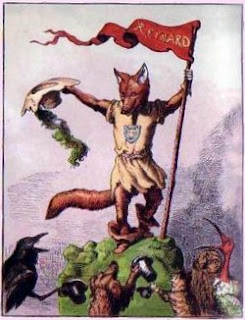The upshot of the sad dog story below is that over in the dining room of my new apartment is a Welsh Cardigan Corgi* puppy, 4 months old, who is quietly and happily tearing apart his stuffed sheep.
We still miss the dogs we had to send back, but we do dearly love Rhys**. He's focused, and intense, and hilarious. He loves his training sessions. He was housetrained, pretty much, within a week after he arrived; he was crate trained immediately. He's cute. He's loving. He fits in the apartment.
The only real problem we had is that the Corgis are cattle dogs. They don't herd people by butting up against them and trying to shoulder them into the kitchen. They herd people by biting their ankles and/or standing stock still in front of them and barking incessantly. The barking is tolerable; the ripping up our clothes and ankles is not.
When we went to the first puppy kindergarten class, I saw how deeply ingrained this behavior is; he spent the entire "free play time" herding the other little puppies, running flat out in a semi-circle around them, getting them to stay together, much to their confusion. I have never before or since seen him so completely joyful, and so completely energized.
We were given lots of advice. First: yelp when he bites, so that he knows he needs to bite more softly (this being the method used by the puppy's littermates). This method worked very well for all the pieces of our bodies that weren't our ankles; it did NOT work for our ankles, which he would then bite more fiercely and bark at. Our ankles weren't pieces of our bodies, you see. They were pieces of recalcitrant cows.
Second: distract the puppy's attention with a chew toy. This method might well work for other dogs. Pomeranians, maybe. Cardigan Corgis, I don't think so. Again. More biting, more barking.
Third: Yelp and leave the room. Well, perhaps this would have worked if leaving the room didn't include more biting and barking.
I thought up a training method of my own, which was that I kept dog kibble in my pocket, and whenever Rhys went for my ankles, I said "stop!" and if he did, and didn't then bark at me (since the biting and the barkiing are both herding activities and connected), he got a treat. Or, if I walked by him and I saw him THINK about going for my heels, and he didn't, he got a treat. I practiced this activity, whenever he started herding me, by walking back and forth through the room and giving him treats whenever he didn't go for my ankles or start barking.
This was a brilliant training method, except it didn't work. He would stop for a bit, and then later start in again, only worse.
One day I hit the wall, and said to him, "time out," and took him and put him upstairs in the crate he sleeps in (I did this cheerfully, since the crate's not for punishment). In a few minutes I took him out. He went for my heels again. I put him in time out. We did this five times. He stopped going for my heels.
The next day the child came over, and when Rhys started herding him, we started the time out procedure. He stopped.
The next day Laura came by, and he herded her; we started time out, and he stopped.
The next day when the child was here Rhys started standing in front of us barking; I said, "Rhys, do you need time out?" and he went and lay down on his dog pillow.
And ever since then, he's fine.
Sometimes when he's really tired, he'll start herding us again; we put him in the crate, and he goes to sleep.
He's also figured out that when he's really frustrated with us, he can "pretend herd," by getting his teeth around his stuffed sheep, and then butting our ankles with his nose. This is fine by me, cause it lets him tell us what he wants to tell us, without breaking either our ankles or our eardrums.
I enjoy this dog a lot. Lots of brains. Highly trainable. Very devoted to his people. Really worth the energy and time.
*******************************
*That is, a Welsh Corgi, but not the kind the Queen owns. Both breeds were bred for cattle and sheep herding in Wales, but on two different sides of a mountain range. There's been some interbreeding, and they have some characteristics in common, but they have different ancestries.
**Spelled "Reese" in English, it means "exuberant." Yep.
Subscribe to:
Post Comments (Atom)


2 comments:
Wow, "ankle biter" isn't always a metaphor! It all sounds good, though.
So glad you're back! What a summer and fall, wasn't it? The good part is: it's OVER!!
love to you!
he sounds a sweetie,,,,,
hope he continues to improve re not ankle biting!
but hey we get the Dog Whisperer program over here now, maybe I will see him on that!
Glad he is not like the queens dog's!!!!
love ann from not so merry old england!
Post a Comment